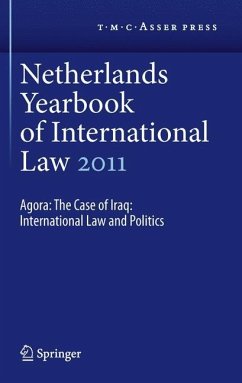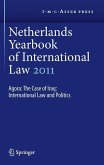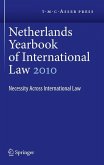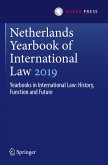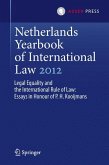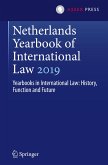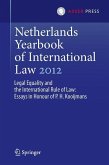The Netherlands Yearbook of International Law (NYIL) was first published in 1970. It offers a forum for the publication of scholarly articles of a more general nature in the area of public international law including the law of the European Union.
This Agora of the NYIL raises the fundamental question: what does the 2003 Iraq intervention teach us about the relation between international law and politics? The scholarly articles in this volume address that question from different angles, including the perspective of international relations, international legal theory, positive international law, discourse analysis, as well as the views of an international legal advisor. The contributions depict a rich and complex image of the relationship between international law and politics: beyond the relative indeterminacy of the law and beyond the collapsed boundary between international law and politics, it appears as if an international rule of law re-emerges as a specific way of doing politics.
This Agora of the NYIL raises the fundamental question: what does the 2003 Iraq intervention teach us about the relation between international law and politics? The scholarly articles in this volume address that question from different angles, including the perspective of international relations, international legal theory, positive international law, discourse analysis, as well as the views of an international legal advisor. The contributions depict a rich and complex image of the relationship between international law and politics: beyond the relative indeterminacy of the law and beyond the collapsed boundary between international law and politics, it appears as if an international rule of law re-emerges as a specific way of doing politics.
This Agora of the NYIL raises the fundamental question: what does the 2003 Iraq intervention teach us about the relation between international law and politics? The scholarly articles in this volume address that question from different angles, including the perspective of international relations, international legal theory, positive international law, discourse analysis, as well as the views of an international legal advisor. The contributions depict a rich and complex image of the relationship between international law and politics: beyond the relative indeterminacy of the law and beyond the collapsed boundary between international law and politics, it appears as if an international rule of law re-emerges as a specific way of doing politics.
This Agora of the NYIL raises the fundamental question: what does the 2003 Iraq intervention teach us about the relation between international law and politics? The scholarly articles in this volume address that question from different angles, including the perspective of international relations, international legal theory, positive international law, discourse analysis, as well as the views of an international legal advisor. The contributions depict a rich and complex image of the relationship between international law and politics: beyond the relative indeterminacy of the law and beyond the collapsed boundary between international law and politics, it appears as if an international rule of law re-emerges as a specific way of doing politics.

